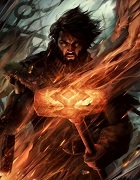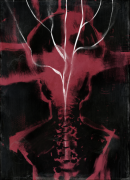|
the two of you have both made the argument that there is no criticism of genre books ITT, so I can't really grapple with waiting for criticism ITT and trying to portray it as a major problem with the genre as a whole. Can we criticize genre books ITT, or does our criticism have to pass your bar for talking poo poo on genre fiction? Does the criticism have to be criticism on the genre as a whole to be real? do I need to call a group of people that will never read this "subhumans"? (USER WAS PUT ON PROBATION FOR THIS POST)
|
|
|
|

|
| # ? May 31, 2024 17:46 |
|
Mel Mudkiper posted:So, reading about The Praxis I came across what might be, without hyperbole, the most hilariously insipid review I have ever read
|
|
|
|
quantumfoam posted:
I don't understand this mindset list site. It is just cataloguing the preconceived notions of a matriculating class by year? What does that have to do with the mentality of the medieval period? Or are you saying mentalities change too quickly to be represented accurately by an author writing about the distant past?
|
|
|
|
The Peripheral by William Gibson - $2.99 https://www.amazon.com/dp/B00INIXKV2/ I Am Legend by Richard Matheson - $2.99 https://www.amazon.com/dp/B07XB49BG4/ The Company Man by Robert Jackson Bennett - $1.99 https://www.amazon.com/dp/B0047Y0FIM/ The Troupe by Robert Jackson Bennett - $1.99 https://www.amazon.com/dp/B004RD854O/ pradmer fucked around with this message at 03:41 on Jun 17, 2020 |
|
|
|
Ccs posted:I don't understand this mindset list site. It is just cataloguing the preconceived notions of a matriculating class by year? What does that have to do with the mentality of the medieval period? Or are you saying mentalities change too quickly to be represented accurately by an author writing about the distant past? Yes and Yes. The yearly mentality list's stated purpose is to catalogue the preconceived notions of that year's incoming student body for the teachers/admin/faculty staff that will be dealing with them during the school year. [Effort posting that everyone in this thread other than Ccs can safely skip follows] === Rewind that mentality list example by 900 years or 500 yrs, and you would have a vaguely accurate picture as to what the mentality of the people of that period would be. Unless an author did serious background research like JRR Tolkien did throughout his life on ancient history and ancient languages, it is highly unlikely for an author to accurately portray the mentality of whatever medieval period they are trying to portray in-story, just like the Strange Horizon's reviewer stated. For example, Alexandre Dumas, and his highly romanticized fiction about the 17th century. Or Umberto Eco's The Name of the Rose. Or Steven Brust's do-not-steal hahaha spin on Dumas's fiction. ===
|
|
|
|
TheAardvark posted:the two of you have both made the argument that there is no criticism of genre books ITT, so I can't really grapple with waiting for criticism ITT and trying to portray it as a major problem with the genre as a whole. Can we criticize genre books ITT, or does our criticism have to pass your bar for talking poo poo on genre fiction? Does the criticism have to be criticism on the genre as a whole to be real? do I need to call a group of people that will never read this "subhumans"? I just posted a funny review. I have no interest in getting probed for touching the pedophilia in scifi issue.
|
|
|
|
TheAardvark posted:the two of you have both made the argument that there is no criticism of genre books ITT, so I can't really grapple with waiting for criticism ITT and trying to portray it as a major problem with the genre as a whole. Can we criticize genre books ITT, or does our criticism have to pass your bar for talking poo poo on genre fiction? Does the criticism have to be criticism on the genre as a whole to be real? do I need to call a group of people that will never read this "subhumans"? I really don’t think you need to be this aggro about this, there’s no need to pick a fight, especially when the discussion led to that very interesting review of Hurin/Rothfuss that I’d never read before!
|
|
|
|
quantumfoam posted:Unless an author did serious background research like JRR Tolkien did throughout his life on ancient history and ancient languages, it is highly unlikely for an author to accurately portray the mentality of whatever medieval period they are trying to portray in-story, just like the Strange Horizon's reviewer stated. For example, Alexandre Dumas, and his highly romanticized fiction about the 17th century. Or Umberto Eco's The Name of the Rose. Or Steven Brust's do-not-steal hahaha spin on Dumas's fiction. Fantasy is not inherently simulationism, so a precise echoing of our past isn't particularly valuable when creating it. But if you're going to set something amidst all the trappings of the medieval, you should go further than third-hand understandings of its material culture. Most writers aren't even trying, as Roberts wrote: quote:How to make a bridge between our modern sensibilities and the medieval matter? Rothfuss's solution, for good and ill, and mostly for ill, is simply to write the pre-modern as if it is modern. There's ways to avoid this beyond amassing a few centuries of medieval listicles trivia like "to new students at Oxford in 1190, Thomas Becket has always been dead". Shaking up the prose style would really help: get a copy of the Decameron, or Wuthering Heights, or Conan. Getting a well-researched book on an alternate set of mentalities would really help (and again, there's lots out there: this is a whole branch of history). It's less about trying to write a specific somewhere else and more about trying to not be a general, generic here and now. quote:Here is a little excerpt from what I read. The persons talking are a duke of the blood royal of a mythical Kelcie kingdom, and a warrior-magician--great Lords of Elfland, both of them.
|
|
|
|
Haha what’s that passage comparing dialogue from? I want to read what else the author has to say about writing. Ah I found it, an essay by Le Guin. I feel she’s making a separate point from Roberts though. He’s talking about the mindset of people in the medieval era, she’s talking about the elevation of language in heroic fantasy, where lords wouldn’t talk like politicians because their lordship symbolize “true inward greatness.” I feel most fantasy has dispensed with that kind of characterization though. And clearly medieval lords did not lack any of the morally grey politicking of our modern politicians. So an exchange like that might be true to the mindset of medieval lords even if it doesn’t measure up to the heroic registry of what Le Guin says fantasy fiction should. Ccs fucked around with this message at 01:03 on Jun 17, 2020 |
|
|
|
"From Elfland to Poughkeepsie", Ursula Le Guin, 1973. I'd recommend it. She talks not just about how the newer wave of fantasy was falling into a dry modernism, but also the mistakes authors make even if they want to escape it. EDIT: Hell, here's another excerpt: quote:The most imitated, and the most inimitable, writer of fantasy is probably Lord Dunsany. I did not include a passage of conversation from Dunsany, because I could not find a suitable one. Genuine give-and-take conversations are quite rare in his intensely mannered, intensely poetic narratives, and when they occur they tend to be very brief, as they do in the Bible. The King James Bible is indubitably one of the profoundest formative influences on Dunsany's prose; another, I suspect, is Irish daily speech. Those two influences alone, not to mention his own gifts of delicate ear for speech rhythms and a brilliantly exact imagination, remove him from the reach of any would-be imitator or emulator who is not an Irish peer brought up from the cradle on the grand sonorities of Genesis and Ecclesiastes. Dunsany mined a narrow vein, but it was all pure ore, and all his own. I have never seen any imitation Dunsany that consisted of anything beyond a lot of elaborate made-up names, some vague descriptions of gorgeous cities and unmentionable dooms, and a great many sentences beginning with "And." Some of the assumptions here are pretty interesting: that everyone not just reads but imitates Dunsany, when that was a practice that would be completely gone in another few years. But it's "They know instinctively that what is wanted in fantasy is a distancing from the ordinary" that really strikes me, since I increasingly get the opposite feeling from modern fantasy. Instead there seems to be the idea of taking X old fantasy concept and ruthlessly making it familiar, so that we have modern people speaking and thinking in modern ways fighting in organized standing armies in standard-issue uniforms against the 101st Dragon Corps with our Repeating Crossbow Skirmisher Company and so on. Xotl fucked around with this message at 01:27 on Jun 17, 2020 |
|
|
|
Like in that essay Le Guin says "But in fantasy, instead of imitating the perceived confusion and complexity of existence, tries to hint at an order and clarity underlying existence," which may have been true when she was writing it. But every author since Martin has been consciously writing morally grey characters in highly political situations without any hint of order or clarity. And real history of course has none of that order or clarity, so one could write a modern fantasy story written as truthfully to the medieval mindset as possible and still be writing about a world with confusion and complexity of existence. Unless the medieval mindset brings with it certain religious ideas about the way the universe is ordered that hints and an intrinsic order. I don't know much about the medieval mindset to know if that's true. I definitely agree that modern fantasy strives to make things ordinary. Magic as a resource, or a tool of political gain, or a stop-gap before the wizard can perfect their banking systems and cannons. Or worse, a set of video game instructions with a lot of capitalized words denoting which button is being pressed. Ccs fucked around with this message at 01:21 on Jun 17, 2020 |
|
|
|
The ultimate example has to be the Foundryside books, where “wizards” are just computer programmers and “magic” is coding logic arguments on brass tablets so whoever codes the best is the most powerful wizard. It’s as if he was on a mission to strip every ounce of the fantastic out of fantasy.
|
|
|
|
Ccs posted:Like in that essay Le Guin says "But in fantasy, instead of imitating the perceived confusion and complexity of existence, tries to hint at an order and clarity underlying existence," I find the essay less valuable when it focuses on what fantasy is and isn't. While it's the heart of the essay, you can reject a lot of her preconceptions and still read it as a valuable snapshot of what fantasy was and how it was changing, how far back the modernist version goes, what ways people might be able to get away from it, and what traps to avoid when trying to do so. Some of that definitely ties into the Roberts review. quote:A fantasy is a journey. It is a journey into the subconscious mind, just as psychoanalysis is. Like psychoanalysis, it can be dangerous; and it will change you. The general assumption is that, if there are dragons or hippogriffs in a book, or if it takes place in a vaguely Keltic or Near Eastern medieval setting, or if magic is done in it, then it's a fantasy. This is a mistake. You don't have to believe the first part to believe the second. Xotl fucked around with this message at 01:41 on Jun 17, 2020 |
|
|
|
buffalo all day posted:I really don’t think you need to be this aggro about this, there’s no need to pick a fight, especially when the discussion led to that very interesting review of Hurin/Rothfuss that I’d never read before! Mel Mudkiper posted:I just posted a funny review. I have no interest in getting probed for touching the pedophilia in scifi issue. I agree that I won't post any more about this ITT. If you guys want to argue whether or not genre authors mandate child porn in their books, then let's discuss it in the publishing thread. It's a totally hosed up thing to assert about someone ITT so we shouldn't talk any more about it here, at all. The posters ITT just want to talk about genre fiction. E:https://forums.somethingawful.com/showthread.php?threadid=3927696&pagenumber=2#post505748665 my post. if you want to flame me take it there and let's move this from the SF/F thread AARD VARKMAN fucked around with this message at 01:47 on Jun 17, 2020 |
|
|
|
Ccs posted:Like in that essay Le Guin says "But in fantasy, instead of imitating the perceived confusion and complexity of existence, tries to hint at an order and clarity underlying existence," which may have been true when she was writing it. But every author since Martin has been consciously writing morally grey characters in highly political situations without any hint of order or clarity. And real history of course has none of that order or clarity, so one could write a modern fantasy story written as truthfully to the medieval mindset as possible and still be writing about a world with confusion and complexity of existence. Modern fantasy in the vein of Martin is very much a reaction to the the fantasy Le Guin describes. So many of the most significant moments in ASoIaF come from the reader and focal character realizing there is no "order and clarity." According to Lewis's The Discarded Image at least, the medieval mindset was grounded in the concept of a divinely ordered world. The Order of the Spheres is, I think, the correct term for it.
|
|
|
A human heart posted:Given the number of sci fi writers who 'accidentally' put this sort of thing in their books, don't you think there's a chance that the publishers might like having it in there because it sells, or might even mandate having it in the books. I mean, if your thesis is "A lot of successful SF & F writers are huge perverts, and their perverted stuff often sells very well" you really don't have to look hard to find support for that thesis. Piers Anthony is right there. Heinlein, Marion Zimmer Bradley, etc. Xotl posted:"From Elfland to Poughkeepsie", Ursula Le Guin, 1973. I'd recommend it. She talks not just about how the newer wave of fantasy was falling into a dry modernism, but also the mistakes authors make even if they want to escape it. I've always felt that essay was a little unfair to poor Katherine Kerr and her perfectly pulpy, "hey this is my D&D campaign / SCA story" Deryni novels. It's like if Michael Jordan wrote a newspaper article about how bad his local high school basketball team was. Like, no poo poo, of course you write better than Kerr does, you're Ursula LeGuin. Hieronymous Alloy fucked around with this message at 05:07 on Jun 17, 2020 |
|
|
|
|
Any reccomendations for some good old fashioned adventure fantasy? Nothing complicated, just a good adventure with some likeable characters, preferably with exploring weird places?
|
|
|
|
PeterWeller posted:Modern fantasy in the vein of Martin is very much a reaction to the the fantasy Le Guin describes. So many of the most significant moments in ASoIaF come from the reader and focal character realizing there is no "order and clarity." Eh, morally grey characters hardly started with Martin. Or that his writing is in any way unique. Martin is nowadays a entry author to the fantasy field, but beyond that he is nothing except a decent and lazy author that wrote a trilogy about the war of the roses.
|
|
|
|
Martin's also really bad about his characters and setting being a caricature of what he assumes the period he's writing about would be.
|
|
|
|
Elderbean posted:Any reccomendations for some good old fashioned adventure fantasy? Nothing complicated, just a good adventure with some likeable characters, preferably with exploring weird places? For solid adventure fantasy in neat settings, here's a list: The general "hey I just want a good story" recommendation thread consensus is Bridge of Birds by Barry Hughart. For something more traditionally western-european (specifically Welsh), Lloyd Alexander's Chronicles of Prydain, Roger Zelazny's Lord of Light (technically sf, but the technology is indistinguishable not just from magic, but also from religion), Guy Gavriel Kay's Lions of Al-Rassan. If you want traditional fantasy that gets *slightly* weird, try Neil Gaiman's Stardust, which is basically Gaiman going through his Dunsany phase (as per LeGuin above). Or go back to the root and read Dunsany's The King of Elfland's Daughter. Or, hell, A Wizard of Earthsea is still drat hard to beat.
|
|
|
|
Elderbean posted:Any reccomendations for some good old fashioned adventure fantasy? Nothing complicated, just a good adventure with some likeable characters, preferably with exploring weird places? You ever read The Dragonbone Chair by Tad Williams? Very old fashioned, quite a good example of it's type, got some decent characters that I didn't hate, and did do some interesting exploration. I think it checks all your boxes if you haven't read it already. The previously mentioned Lord of Light and Wizard of Earthsea are pro picks too, of course.
|
|
|
|
Gnoman posted:Martin's also really bad about his characters and setting being a caricature of what he assumes the period he's writing about would be. I'm aware of a grand total of two authors of historical fiction* who have ever managed to write 1) characters that were sympathetic to a modern reader, while also 2) being believable inhabitants of their own historical eras. Those two are Mary Renault and Patrick O'Brian, respectively. Not coincidentally, both of them had invested decades of research into their respective subject areas before they set pen to paper to write fiction. Bernard Cornwell manages to fake #2 well enough that it doesn't actively annoy me, but he does it by just writing his characters as rather unintelligent creatures of pure id, so questions like "what does Sharpe think of slavery?" just never come up. Pretty much every other successful "historical fiction" writer just puts modern characters in period costumes. Martin doesn't even really do that; he just writes whatever will make his readers wince the hardest. (*maybe three if you count Susannah Clarke, who's the only fantasy author I'm aware of who's ever pulled off the trick of writing in a consistent historical-period voice. Even Tolkien shifts about ; Hobbiton is in the 18th century, Rohan the 6th, Gondor the 1st). Hieronymous Alloy fucked around with this message at 05:32 on Jun 17, 2020 |
|
|
|
|
Cardiac posted:Eh, morally grey characters hardly started with Martin. Or that his writing is in any way unique. Martin is nowadays a entry author to the fantasy field, but beyond that he is nothing except a decent and lazy author that wrote a trilogy about the war of the roses. Sure, you can trace morally grey characters in fantasy back to Boromir or Elric or Fafrd and the Grey Mouser or Conan even. That's not my point. Martin is, however, the most widely known example of more contemporary fantasy that is specifically questioning or "subverting" the sort of fantasy Le Guin described.
|
|
|
|
Hieronymous Alloy posted:I've always felt that essay was a little unfair to poor Katherine Kerr and her perfectly pulpy, "hey this is my D&D campaign / SCA story" Deryni novels. It's like if Michael Jordan wrote a newspaper article about how bad his local high school basketball team was. Like, no poo poo, of course you write better than Kerr does, you're Ursula LeGuin. Especially because it’s ragging on Katherine Kurtz, not Kerr. Also I think it’s a little unfair to Kurtz because so many of her novels were focused on, basically, the politics of the notCatholic Church with the serials half-assed filed off. And that poo poo hasn’t changed much and isn’t all that different from modern politics.
|
|
|
|
I think Le Guin is wrong at the end of that essay when she says that style is so important because “in fantasy there is nothing but the writer’s vision of the world. There is no borrowed reality of history ... there is no comfortable matrix of the commonplace..” Except, of course, there is, because fantasy/sci-fi books which involve a world which has nothing in common with our own would be completely uninteresting to human readers. Almost all genre books are variations on a shared vision of what a fantasy world is like (faux-medieval) or what a sci-fi world is like, and that world is very like our own because the further you get from it the less interesting it becomes. Le Guin had an interest in anthropology and it shows in what she writes and likes to read. She wants verisimilitude and the feeling that she is observing a different culture. Most readers are not looking for that. That is, this is intentional, not failure of the author: Gnoman posted:Martin's also really bad about his characters and setting being a caricature of what he assumes the period he's writing about would be. Also Le Guin’s excerpts of ‘real fantasy’ look pretty cringeworthy to me, but I guess we’ll just put it down to individual taste.
|
|
|
Hieronymous Alloy posted:Martin doesn't even really do that; he just writes whatever will make his readers wince the hardest. Not wanting to create a huge derail, but this is exactly the issue. Martin's characters are all cynical cardboard cutouts that are little more than a single character trait exaggerated into absurdity for the sake of giving as much offense as possible. If Westeros was a real place, the nobility would either have been slaughtered, or else rule over barren wasteland within a few years.
|
|
|
|
|
Not to nitpick, but the nobility is regularly slaughtered in Matin’s books and has been for centuries.
|
|
|
Captain Monkey posted:Not to nitpick, but the nobility is regularly slaughtered in Matin’s books and has been for centuries. Not to the extent that they should be. They mismanage their lands so badly (because Martin wants to portray them as unconcerned with their "lessers", and doesn't actually understand the way the system was supposed to work) that the smallfolk would be rising up multiple times within the course of the books. Historical nobles faced mass desertion and outright rebellion of their serfs and/or peasants for far less offenses than what Martin's rulers treat as routine.
|
|
|
|
|
jng2058 posted:You ever read The Dragonbone Chair by Tad Williams? Very old fashioned, quite a good example of it's type, got some decent characters that I didn't hate, and did do some interesting exploration. I think it checks all your boxes if you haven't read it already. Agree with The Dragonbone Chair. Old-fashioned fantasy adventure that does some interesting things with it.
|
|
|
|
Xotl posted:"From Elfland to Poughkeepsie", Ursula Le Guin, 1973. I'd recommend it. She talks not just about how the newer wave of fantasy was falling into a dry modernism, but also the mistakes authors make even if they want to escape it. I'm not sure that modernism is really the word you want here, if you're just meaning stuff that sounds contemporary.
|
|
|
|
Right now I'm about halfway through the 1983 SF-LOVERS digest (Vol 04) and John Norman's Gor books are getting discussed. For people who never heard of GOR, the GOR books were a long-running (20+ years) harem fiction series written by a IRL college philosophy professor. The GOR books were sex-pervy enough to have broken the SF-LOVERS unspoken taboo of "Big Name genre authors are sacred cows, do not discuss Big Name/little name authors being sex predators or worse". Taking that caveat into perspective, finding that the SF-LOVERS mailing discussions were pretty similar to what gets discussed here, only it's the books, movies, authors and pop-culture of 40 to 20 years ago being discussed. The George RR Martin of that era being a Brandon Sanderson style machine is very funny. https://archive.org/details/SFLoversDigestArchive
|
|
|
|
Lol the wikipedia article on GOR: "While not officially connected to John Norman's work, Fencer of Minerva is a Japanese animated series containing many of the elements and ideas discussed in Gorean philosophy.[13] During the mid-1990s, an attempt was made to publish an authorized graphic novel adaptation of the Gor series under Vision Entertainment. The project collapsed under a combination of financial issues and the nature of the imagery, which violated Canadian law, where the printer was located.[14] " Dude got a borderline pornographic anime made from his work, probably without even knowing what anime was. How many fantasy authors today would love an anime adaption of their works? That must've been some horrible stuff in the comics for it to not be able to be printed. Manga like Berserk gets sold in Canada, I have a hard time seeing how they could beat that imagery...
|
|
|
|
I'm a massive nerd. As such, I'm a great fan of Greg Egan. Is there any other current author who could scratch the same itch?
|
|
|
|
Maybe Hannu Rajaniemi?
|
|
|
|
The funniest thing about John Norman was that he wrote a sex manual called "Imaginative Sex" and it was all basically Gorean stuff.Prism Mirror Lens posted:Also Le Guin’s excerpts of ‘real fantasy’ look pretty cringeworthy to me, but I guess we’ll just put it down to individual taste. Unless I'm missing something, they're all meant to be. The bit about council lords on the White House lawn is from a Lin Carter book, iirc, and he's not anyone you'd hold up as a good writer. Whoever wanted old-fashioned adventure fantasy: read The Worm Ouroboros by E. R. Eddison, which has wild deeds and characters who are heroes and villains in classical style, aristocratic and unlikeable, all in cod-Elizabethan prose. It really is a shame that so much fantasy and sf is boringly written, it's such a waste. I just reread Babel-17 and, although it's a fairly conventional, Heinleinish adventure story, it's really done well; there are so many little details and surprises, and the description is wonderful; this passage is unique: quote:Drop a gem in thick oil. The brilliance yellows slowly, ambers, goes red at last, dies. This is how Delany chooses to describe a spaceship's travel. No crap about parsecs or rockets or liftoff.
|
|
|
|
Safety Biscuits posted:
Don't forget excrutiating and overly-detailed descriptions of any gem carvings in a 100-mile radius. (I enjoy his dialogue, but he keeps stopping to list the fillagree) Strom Cuzewon fucked around with this message at 17:14 on Jun 17, 2020 |
|
|
|
Safety Biscuits posted:The funniest thing about John Norman was that he wrote a sex manual called "Imaginative Sex" and it was all basically Gorean stuff. Everything in it is deadly serious and that just adds to the hilarity. Science Fiction Fantasy Megathread 3: Have you read GOR?....DON'T read GOR quantumfoam fucked around with this message at 17:26 on Jun 17, 2020 |
|
|
|
Dzhay posted:I'm a massive nerd. As such, I'm a great fan of Greg Egan. I assume you've already read every Ted Chiang story?
|
|
|
|
A human heart posted:I'm not sure that modernism is really the word you want here, if you're just meaning stuff that sounds contemporary. Fair enough: that's freighted with all sorts of other meaning. I'm not sure what other term fits, offhand.
|
|
|
|

|
| # ? May 31, 2024 17:46 |
|
quantumfoam posted:No. The funniest thing about John Norman is the "Gorean subculture" wikipedia page which I'm not linking to because it contains NSFW images. Still wrong. This is the funniest thing about John Norman, http://www.rdrop.com/~wyvern/data/houseplants.html Houseplants of Gor posted:HOUSEPLANTS OF GOR
|
|
|




































